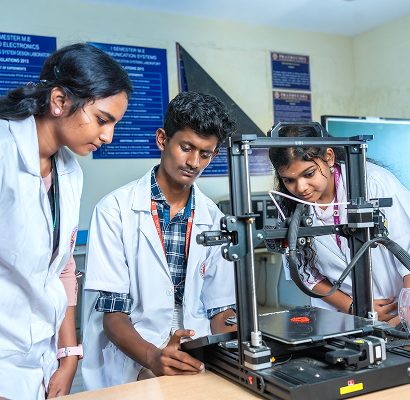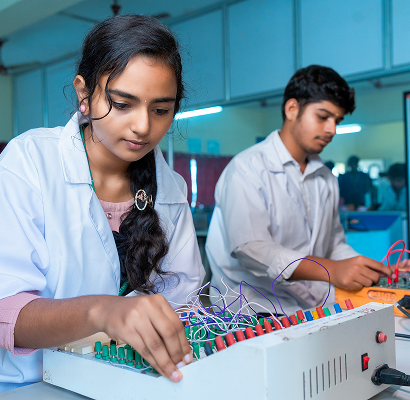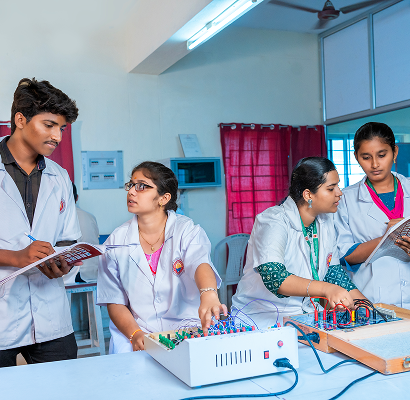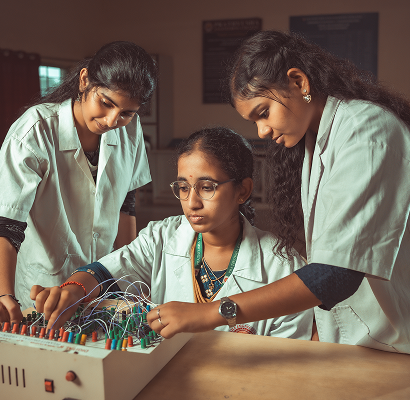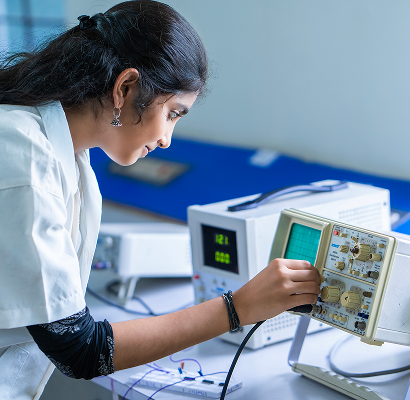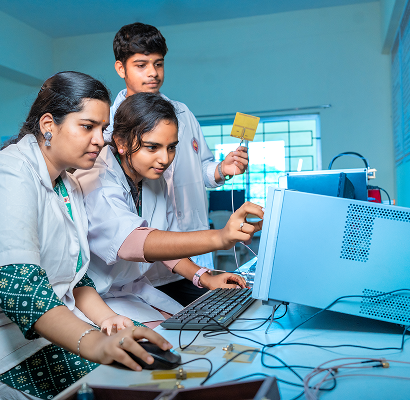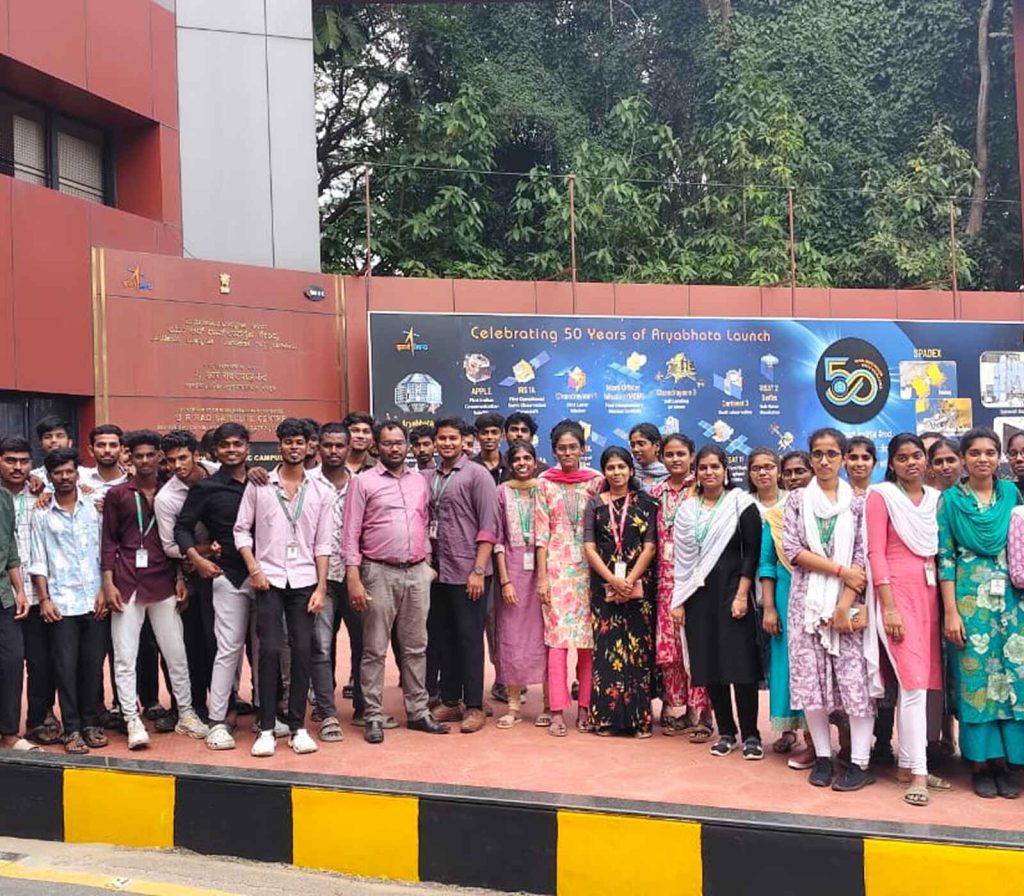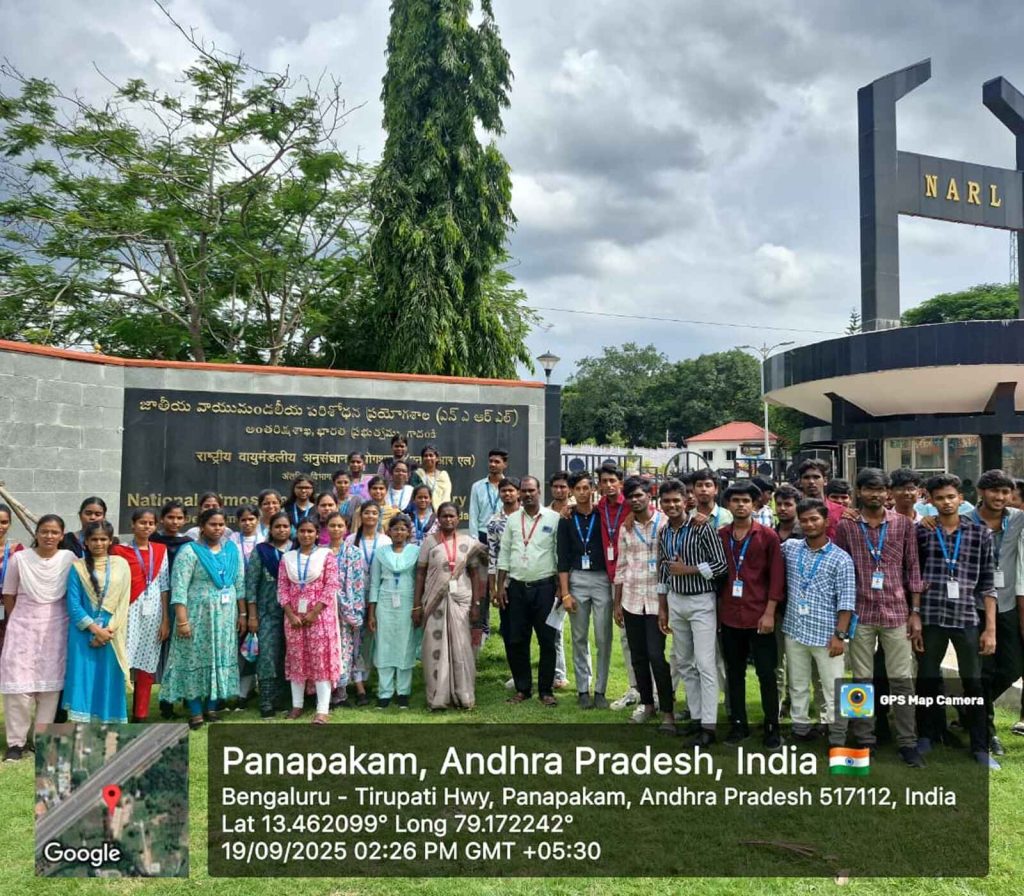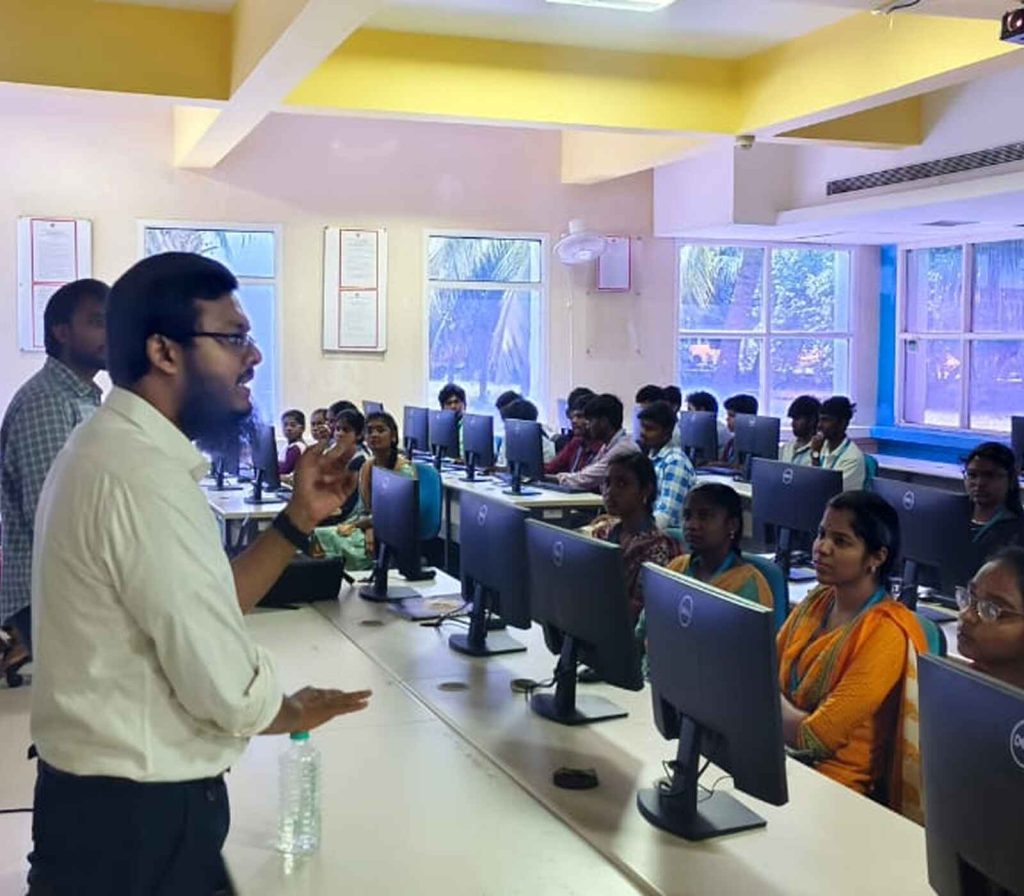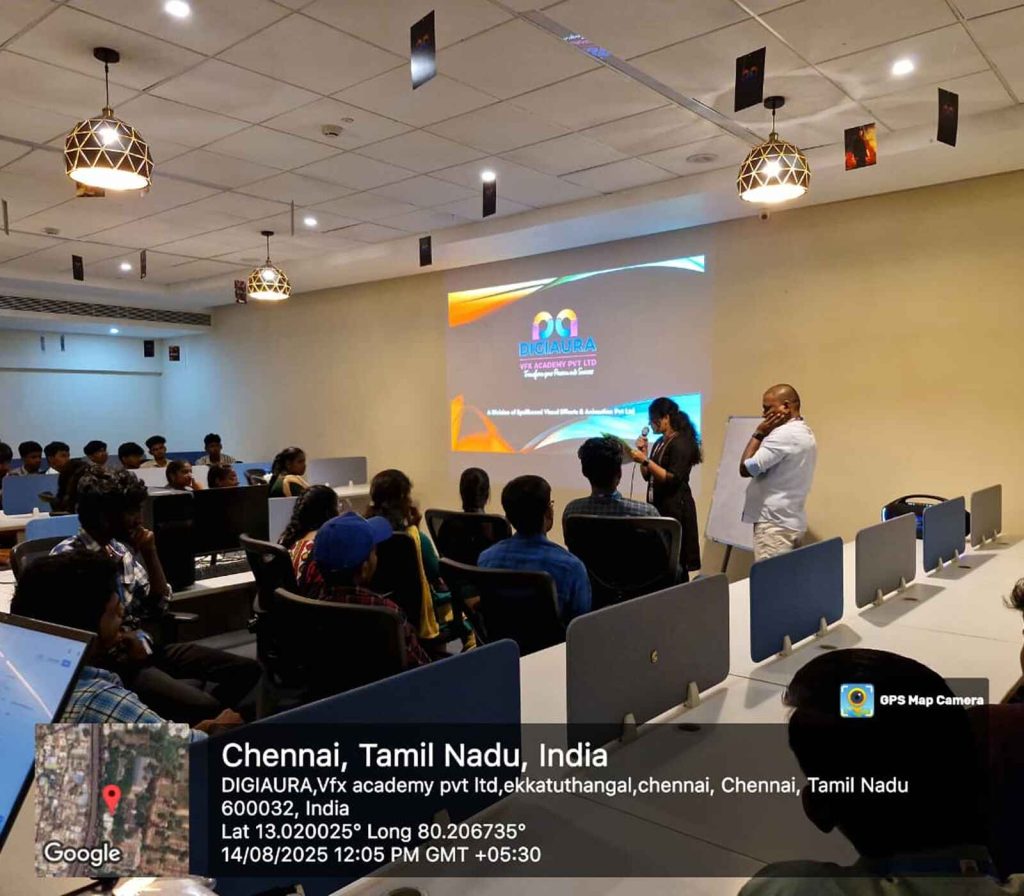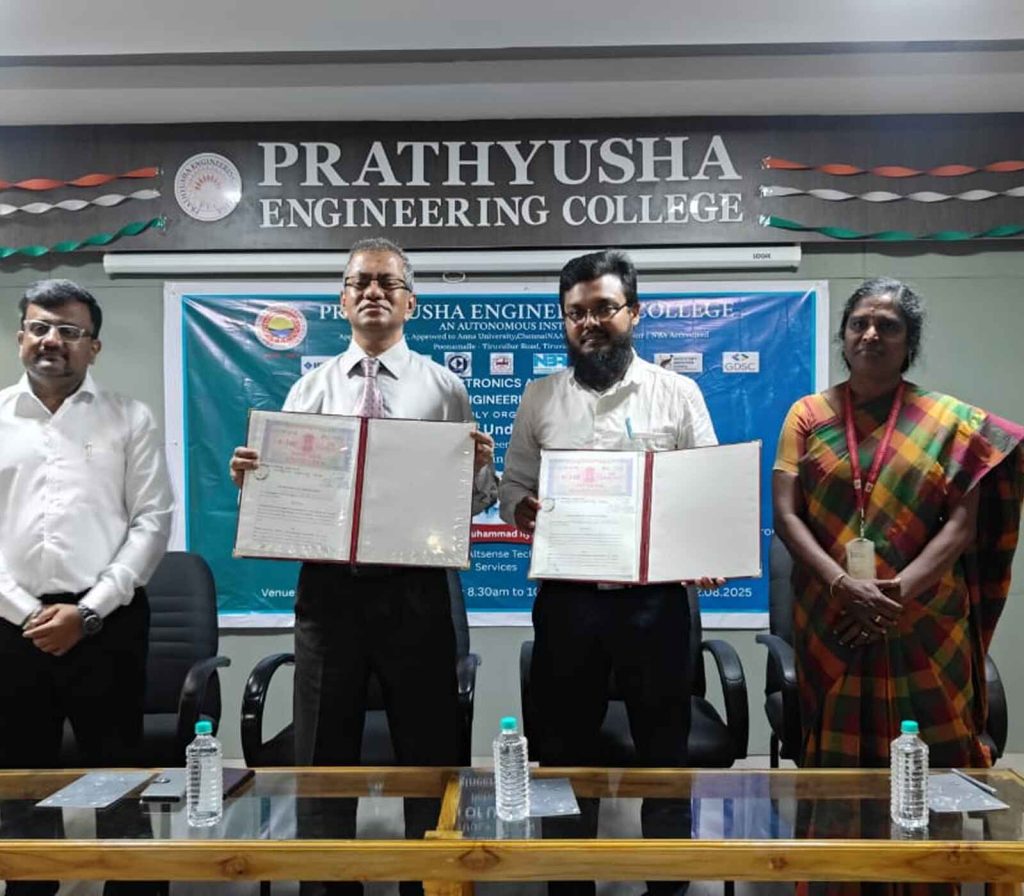- Result : 2021-22 Percentage : 100%
- Result : 2020-21 Percentage : 68.52%
- Result : 2018-19 Percentage : 82.5%
- Result : 2018-19 Percentage : 74.19%
- Result : 2017-18 Percentage : 84.79%
- Result : 2016-17 Percentage : 85.7%
- Result : 2015-16 Percentage : 70%
- Result : 2021-22 Percentage : 100%
- Result : 2020-21 Percentage : 68.52%
- Result : 2018-19 Percentage : 82.5%
- Result : 2018-19 Percentage : 74.19%
- Result : 2017-18 Percentage : 84.79%
- Result : 2016-17 Percentage : 85.7%
- Result : 2015-16 Percentage : 70%
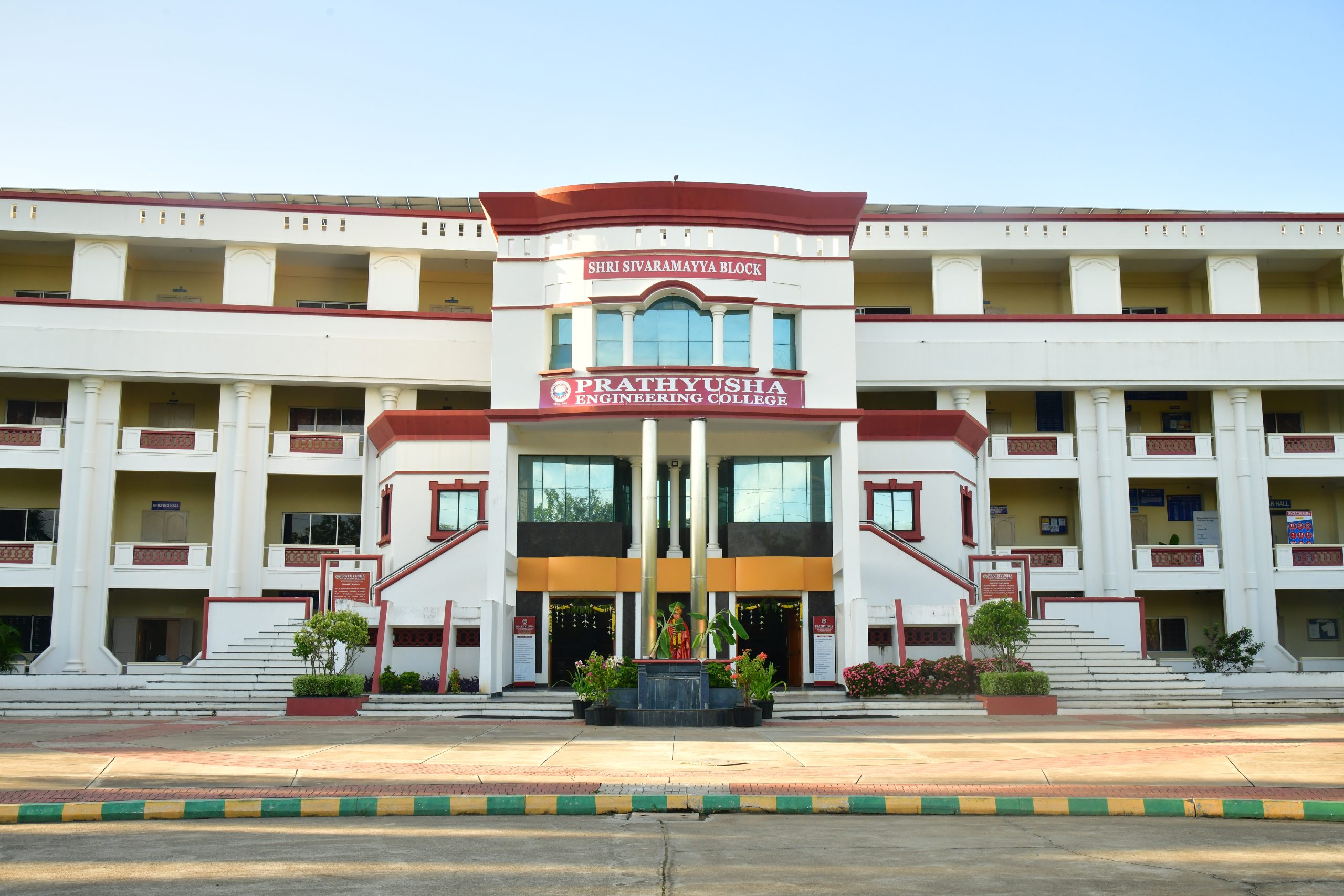
About The Department
Department of Electronics and Communication Engineering was established since the inception of the college in 2001 in order to meet the wide range of challenging and rapidly growing global demands for professional education. With every passing year, the department aims at unfolding new possibilities and making breakthroughs in the technological industry. The department is staffed with stellar faculty who are in constant pursuit of creating competent professionals in the field. With their perseverance and dedication, the students are assured of getting a best education. The department has secured permanent affiliation from Anna University and is accredited by the NBA. In pursuit of excellence, the department is recognized as a research center by Anna University to pursue Ph.D. in the areas relevant to electronics and communication.
The department has received grants under the MODROBS scheme from AICTE, and funds to conduct various programs like faculty development programs, seminars, workshops, and conferences were received from IEEE, ISTE, IETE, IEI, and other sponsoring agencies. Faculty members have received research project funding from funding agencies like DST and have several published patents. Strong Industry-Interaction with reputed organizations and MoUs with the best industries have enabled the students to be industry ready. Students of the department of ECE have excelled in various fields like Hackathons, Design competitions, paper presentations, Project expos, and Quiz competitions outside the campus and won cash prizes and trophies. The department of ECE has a consistent Placement record and has a quality intake of students.
Opportunities that Electronics Engineering offers
Studying from the best college for electronics engineering opens doors for various opportunities. The scope of electronics engineering is far-reached; it can be linked with every field worldwide. A life without electronic gadgets is implausible. With the insight to digital technology, the potential of the electronics engineering sector is on an ever-high stand.
Various career opportunities help the students to create a secure future across various fields such as Automation Systems, Data Acquisition, Signal Processing, Embedded System, IoT, IC Design, and Telecommunication. Electronics engineering education opens up opportunities in design and manufacturing companies with job roles in research, design or development.
In a nutshell, the electronics engineering sector forms the vertebrae at all stages of development: planning, executing, and delivering the product. As an electronics engineering aspirant, students can choose which part of the process excites them the most.
Vision & Mission
Vision
- To promote academic growth by offering state-of-the-art undergraduate and graduate programs, and to evolve as a Centre of Excellence in Electronics and Communication Engineering equipped with highly-skilled, trained and confident engineers imbued with knowledge of core as well as inter disciplinary domains.
Mission
- To produce competent Engineers adequately prepared to face challenges of the society and also provide adequate practical training in laboratory which meets the requirement of the Electronics and Communication Engineering
- To develop innovative and simple instructional material for theoretical and practical subjects to drive the concepts in to the minds of students and guide them towards the success in Electronics and Communication Engineering.
- To develop the Department into a full–fledged center of learning in various fields of Electronics and Communication Engineering keeping in view the latest developments.
- To develop overall personality of the students by encouraging them to participate in technical activities, sports and personality development programe.
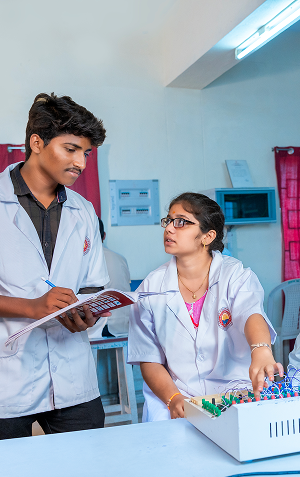
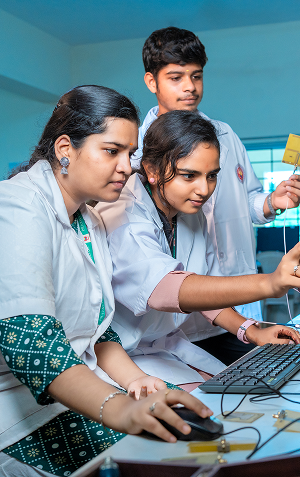
PO,PEO,POS
Programme Outcomes (POs)
At the end of the programme students will be able
- To Apply the knowledge of mathematics, science, engineering fundamentals and an engineering specialization to the solution of complex Electronics and Communication engineering problems.
- To Identify, formulate, review research literature, and analyze complex Electronics and Communication Engineering problems reaching substantiated conclusions using first principles of mathematics, natural sciences and Engineering sciences.
- To Design solutions for complex Electronics and Communication Engineering problems and design system components or processes that meet the specified needs with appropriate consideration for the public health and safety, and the cultural, societal, and environmental considerations.
- To Conduct investigations of complex problems: Use research-based knowledge and research methods including design of experiments, analysis and interpretation of data, and synthesis of the information to provide valid conclusions.
- To Create, select, and apply appropriate techniques, resources, and modern engineering and IT tools including prediction and modeling to complex Electronics and Communication engineering activities with an understanding of the limitations.
- To Apply reasoning informed by the contextual knowledge to assess societal, health, safety, legal and cultural issues and the consequent responsibilities relevant to the professional engineering practice.
- To Analyse the impact of the professional engineering solutions in societal and environmental contexts, and demonstrate the knowledge of, and need for sustainable development.
- To Apply ethical principles and commit to professional ethics and responsibilities and norms of the engineering practice.
- To Function effectively as an individual and as a member or leader in diverse teams, and in multidisciplinary settings.
- To Communicate effectively on complex engineering activities with the engineering community and with society at large, such as, being able to comprehend and write effective reports and design documentation, make effective presentations, and give and receive clear instructions.
- To Demonstrate knowledge and understanding of the engineering management principles and apply these to one’s own work, as a member and leader in a team, to manage projects and in multidisciplinary environments.
- To Recognize the need for and have the preparation and ability to engage in independent and lifelong learning in the broadest context of technological change.
Programme Educational Objectives (PEOs)
PEO-1: To inculcate knowledge and an ability to identify, analyze and solve engineering problems associated with their professional position independently and in team environment through lifelong learning.
PEO-2: To enable the Graduates to become dynamic professionals in industries.
PEO-3: To enable the graduates to use the knowledge and communication skills acquired in their graduate program for the development of the nation.
Programme Specific Objectives (PSO’s)
PSO1: The ability to analyze and apply concepts of Electronics and Communication Engineering in the analysis, design, and development of analog and digital integrated electronic systems as well as to interpret and synthesize the experimental data leading to valid conclusions using modern tools such as Lab View.
PSO2: The ability to use electronic modern tools for the analysis and design of complex Engineering problems in the design of antenna systems.
PSO3: The ability to analyze, design and solve complex engineering problems in Embedded systems and Robotics.
Achievements

Mr.Kannan
Mr.Kannan, II ECE has been a part of the team of FILPKART GRID 3.0 ROBOTICS CHALLENGE and won the First Prize of Rs. 1,50,000. After 9000 registrations, 46 teams making it to the Round 1 Finals, they have won the prestigious Flipkart Grid 3.0 Robotics Track Trophy. Dated: 2022.

Mr.Bhargav
Mr.Bhargav, IV ECE got III Prize at ELECTROFOCUS ’22 (Project Contest) at MADRAS INSTITUTE OF TECHNOLOGY, ANNA UNIVERSITY. Dated: 7/5/22 & 8/5/22.

Ms.Vindhya.K
Ms.Vindhya.K, III ECE got III Prize at WIZELECTRA’22 (Paper Presentation) at Loyola Institute of Technology. Dated: 04-01-2022.

Mr. G. Charan, Mr. SakalaUdayManideep, Ms. BodduSwetha & Ms. Y. Vijaya Shri
Mr.G.Charan, Mr.SakalaUdayManideep, Ms.BodduSwetha&Ms.Y.Vijaya Shri, IV ECE received Best paper award at “NATIONAL CONFERENCE ON FRONTIERS IN COMMUNICATION AND SIGNAL PROCESSING SYSTEMS” – ADHIYAMAAN COLLEGE OF ENGINEERING. Dated: 28/4/22 & 29/4/22.

Mr.Kannan
Mr.Kannan, II ECE got II Prize at SRISHTI NATIONAL LEVEL TECHINICAL EXHIBITION (Project Contest) – SAINTGITS COLLEGE OF ENGINEERING, Kerala. Dated: 25/4/22 & 26/4/22.
Your Pathway to Growth
| Academic Year | SCI/Scopus / UGC / Other Journal Publications | Scopus / National / International Conference Publications | Patents Published | Books / chapters Published | Total | Details |
|---|---|---|---|---|---|---|
2024 – 2025 | – | – | – | – | – | |
2023 – 2024 | 11 | – | – | – | 11 | |
2022 – 2023 | 8 | – | – | – | 8 | |
2021-2022 | 12 | 14 | – | – | – | |
2020-2021 | 13 | – | – | – | 13 | |
2019-2020 | 14 | – | – | – | 14 | |
2018 – 2019 | 16 | – | 1 | – | 17 | – |
| Govt./ Consultancy | Academic Year | Name of The programme/Project | Founding Agency | Amount Sanctioned & Received (Rs) | Total Amount |
|---|---|---|---|---|---|
Govt. Funding Agency | 2023-2024 | AI-Assisted Career Guidance Application | Naan Mudhalvan – Niral Thiruvizha | 10000 | 2278275 |
2022-2023 | Application for Prisoners Rehabilation | Naan Mudhalvan – Niral Thiruvizha | 10000 | ||
2021-2022 | Patent Law for Engineers and Researchers | AICTE-ATAL Online FDP | 93000 | ||
2020-2021 | Financial assistance to a Student Club to develop it as model Club | AICTE – SPICES | 100000 | ||
Building Decision Support System for Sustainable Agriculture Using Data Science | AICTE-ATAL Online FDP | 93000 | |||
2019-2020 | Cognitive Informatics and Deep Learning in Healthcare | AICTE-FDP | 456000 | ||
Data Analytics Lab | AICTE-MODROB | 1516275 | |||
Faculty
Dr.S.Vimala
Professor / HOD
Dr. G. Premalatha
Associate Professor
Dr. N.Sujitha
Assistant Professor
Ms A.Vijayashanthi
Assistant Professor
Mr.J.ArunPrasath
Associate Professor
Ms.C.Ada Christa
Associate Professor
Ms.S.Subbulekshmi
Assistant professor
Ms. A.Priyadharshini
Assistant professor

